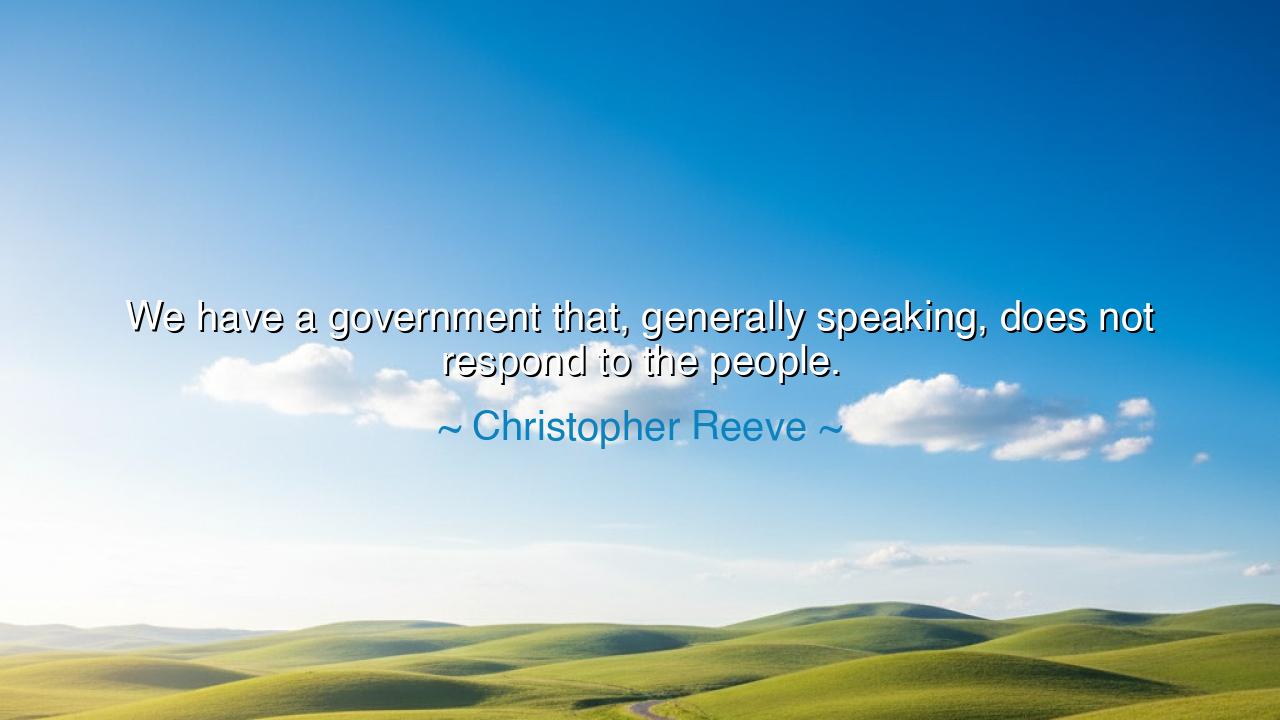
We have a government that, generally speaking, does not respond






"We have a government that, generally speaking, does not respond to the people." – Christopher Reeve
In this piercing and mournful observation, Christopher Reeve, known to the world as both an actor and an advocate, speaks with the voice of a citizen who has glimpsed the distance between the governed and the governors. Behind his words lies no bitterness, but a deep and noble disappointment—a sense that the sacred bond between the people and their government has been weakened by indifference and self-interest. When he says that the government “does not respond to the people,” he is not attacking democracy itself; he is warning that democracy, left unattended, becomes a hollow echo of its ideals. His words call upon every generation to remember that a government is not a master, but a mirror—and when the mirror no longer reflects the face of the people, the republic begins to fade.
The origin of this quote rests in the later years of Reeve’s life, after the accident that left him paralyzed. Though known first for portraying Superman, his truest heroism began when he became a voice for medical research, disability rights, and the hope of stem cell advancement. It was then that he encountered the cold machinery of bureaucracy and politics—the walls of delay, hesitation, and neglect built not by enemies, but by those sworn to serve. His statement was born from that struggle: a cry not of despair, but of moral awakening, a realization that the people’s will too often drowns beneath the tides of money, partisanship, and ambition. He saw how governments spoke of compassion, yet moved slowly to act upon it, how compassion had become a slogan rather than a policy.
To understand his warning, one need only look to history. The French Revolution erupted not because the people despised their nation, but because they were unheard within it. For years they petitioned, begged, and pleaded for relief, but their rulers were deaf to their suffering. Bread prices rose, wages fell, and the peasants’ voices were drowned by the laughter of Versailles. When government ceases to respond to its people, the people will, in time, respond to the government—with fury, with revolt, with change. And though Christopher Reeve spoke in peace, his warning carries the same eternal rhythm: that unresponsiveness breeds unrest, and neglect sows rebellion.
Reeve’s words also echo the wisdom of Abraham Lincoln, who said that government must be “of the people, by the people, and for the people.” Yet Lincoln, too, knew how fragile that promise was. In every age, there are those who would turn public office into private opportunity, who forget that power is a stewardship, not a possession. When government grows distant, when its leaders cease to listen, they drift from the moral foundation upon which all republics are built—the consent and trust of the governed. Reeve’s lament reminds us that democracy does not perish in a single blow; it erodes quietly, through years of apathy and silence, until the people forget that they were ever meant to rule.
But Reeve, ever the believer in human resilience, did not surrender to cynicism. The same man who refused to yield to paralysis also refused to yield to despair. He knew that even a government grown unresponsive can be stirred again by the will of an awakened people. His life itself became a testament to persistence—he fought tirelessly for medical funding, for research, for compassion in policymaking. He demonstrated that to restore responsiveness, citizens must first reclaim their voice—through courage, participation, and moral conviction.
The power of his words lies in their universality. Whether in the halls of Washington or in any capital on earth, when citizens grow silent, rulers grow deaf. The remedy to unresponsiveness is not resentment, but re-engagement. Every petition signed, every vote cast, every act of advocacy is a heartbeat returning to the body of democracy. For the people are not powerless; they are simply sleeping—and when they awaken, no government can long ignore them.
The lesson, then, is both simple and profound: a government that fails to listen is the shadow of a people who have ceased to speak. Do not yield your voice to despair, nor your duty to indifference. Hold your leaders accountable, not with anger alone, but with persistence, clarity, and faith in justice. The greatness of a nation does not reside in its rulers, but in its citizens’ capacity to demand righteousness from them. Christopher Reeve, a man who once soared across screens as a symbol of strength, reminds us that the truest strength lies not in flight, but in standing firm—to speak when others fall silent, to act when others wait, and to keep believing that government, in the end, belongs to the governed.






AAdministratorAdministrator
Welcome, honored guests. Please leave a comment, we will respond soon